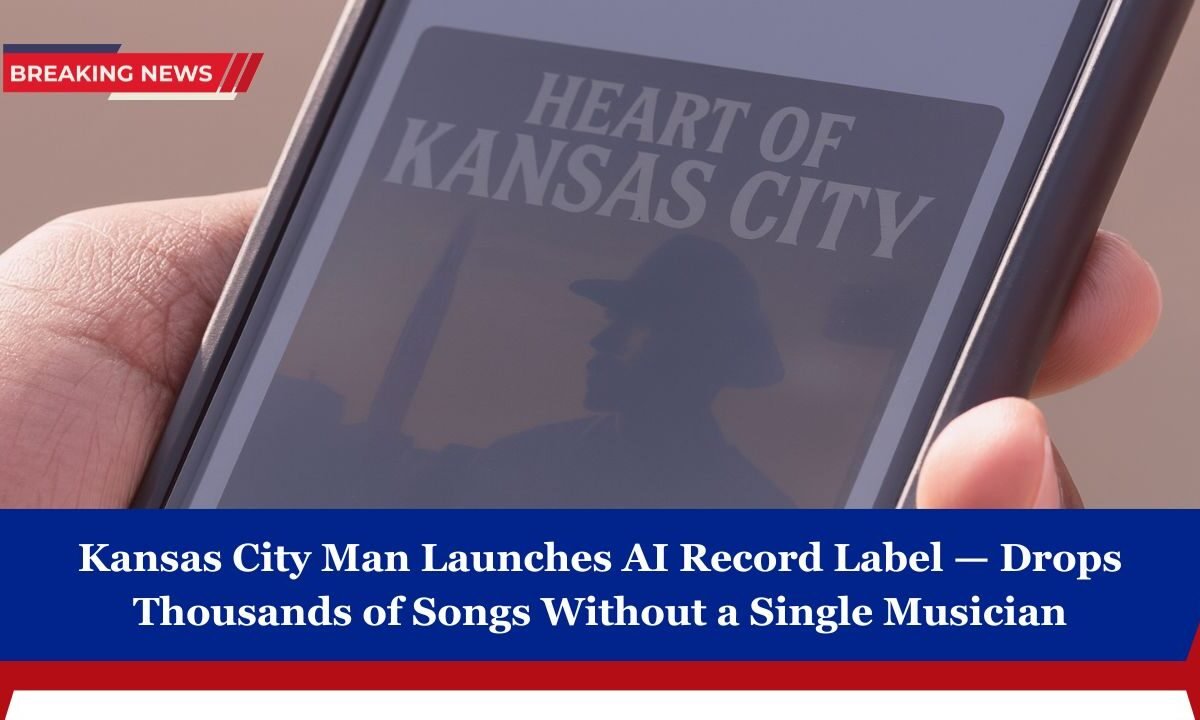In Kansas City, a bold experiment in music production is underway — but it doesn’t involve singers, instruments, or studios. Frank Mburu, a non-musician, has launched Luxe Records, an AI-driven record label that has released over 1,400 songs crafted entirely via algorithms and AI tools.
He uses advanced apps and models to generate full songs (vocals, instrumentation, style) and even produces music videos and runs a 24/7 AI radio station with millions of listeners.
This article delves into how his system works, what the numbers look like, and what implications his venture has for the future of music.
How It Works: AI + Algorithms + Apps
Mburu explains that he relies on multiple advanced algorithms, AI models, and app platforms to craft music in any style.
His main creation tool originates from ChatGPT, which provides structures, lyrics, and guidance. From there, he layers instruments, vocal emulations, and mixing—all via AI systems.
He promotes the tracks through AI-generated music videos and streams them on a 24/7 AI radio station, claimed to be among the few in the U.S. The station reportedly garners millions of listeners.
Mburu frames his approach as a “limitless business tool” for musicians—combining human artistry with algorithmic precision to output crystal-clear songs in bulk.
He also plans partnerships with major distribution services like Amazon to expand reach. Currently, Luxe Records releases content across all social media and streaming platforms.
Key Metrics & Figures
| Metric / Feature | Reported Value / Status | Implication |
|---|---|---|
| Number of songs released | 1,400+ | Large-scale output without human musicians |
| AI radio station | 24/7 operation | Continuous streaming model |
| Listener reach | Millions | Potential audience scale |
| Core AI tool | ChatGPT + algorithmic stacking | Prominent role of large language models |
| Partnerships in pipeline | Amazon & large distributors | Expansion potential |
| Distribution | Social media, streaming platforms | Wide accessibility |
| Business positioning | Tool for artists | A hybrid model, not full replacement |
These figures underscore the scale of Mburu’s ambition: mass production of music using AI and digital automation.
Opportunities & Challenges
Opportunities
- Scalability and volume: The ability to release thousands of songs far faster than traditional production allows.
- Cost efficiency: No need for studios, session musicians, or physical recording overhead.
- Accessibility tool: Independent musicians could use his platform to augment their reach or produce demos rapidly.
- Innovation in music discovery: With huge catalogs, algorithms can aid in matching niche tastes or microgenres.
Challenges & Risks
- Authenticity concerns: Audiences may question emotional or creative legitimacy when no human performer is involved.
- Copyright & IP: As AI-generated music surges, legal frameworks around ownership, sampling, and duplication become murky.
- Market oversupply: Flooding streaming platforms with AI tracks could dilute listener attention and value.
- Quality control: Even with automation, producing consistently high-quality, distinctive tracks is a challenge.
- Industry pushback: Human artists, labels, and unions may resist or lobby against widespread AI-generated content.
Mburu’s approach sits at an intersection: he markets this as a tool, not replacement, for musicians. He seeks partnerships and acceptance rather than adversarial collision.
Implications for the Music Industry
Mburu’s model could accelerate several shifts:
- Democratization of music creation: lowers entry barriers for creatives without access to studios.
- Algorithmic curation: With mass catalogs, AI-driven discovery and personalization become more powerful.
- Hybrid artist models: Traditional musicians may adopt AI augmentation (e.g., co-writing, AI instrumentation).
- Reexamination of value: If machine output dominates, the industry may need new pricing, rights, and curation models.
The emergence of AI record labels like Luxe Records challenges assumptions about authorship, creativity, and distribution in music’s next era.
The creation of Luxe Records by Frank Mburu in Kansas City marks a provocative experiment at the frontier of music and technology.
Releasing over 1,400 AI-composed songs, operating a round-the-clock AI radio station, and aiming for global distribution partnerships, Mburu is redefining what a record label can be.
While questions about authenticity, market impact, and legal frameworks remain, his approach may well foreshadow the next wave of hybrid creativity—where human sensibility and algorithmic power converge.
Whether as tool, competitor, or complement, AI-powered music is no longer hypothetical—it’s here.




